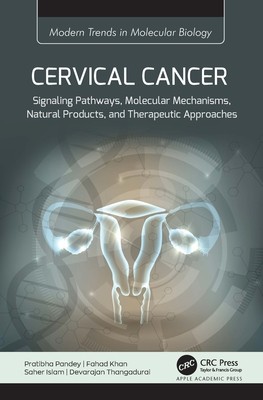
- We will send in 10–14 business days.
- Publisher: Apple Academic Press
- ISBN-10: 1774915669
- ISBN-13: 9781774915660
- Format: 15.2 x 22.9 x 1.9 cm, hardcover
- Language: English
- SAVE -10% with code: EXTRA
Cervical Cancer (e-book) (used book) | bookbook.eu
Reviews
Description
There has been a tremendous advancement in cancer therapeutics, and this book focuses on new approaches to one of the major cancers of the female reproductive system--cervical cancer. Cervical cancer is the fourth most frequent cancer in women worldwide and, especially, a foremost cause of morbidity in women in developing countries, including India. Several research findings have suggested that modulation in various signaling pathways is responsible for cervical cancer pathogenesis, and inhibition of these crucial pathways could be a better therapeutic approach for cervical cancer management. This book expounds on this approach, providing a detailed insight of the deregulated oncogenic signaling pathways involved in the progression of cervical cancer.
The key topics covered within this book include
- Signaling pathways involved in cervical cancer
- Mechanisms behind the involvement of these aberrant signaling pathways
- Cell signaling pathways and their alterations in cancer
- Molecular biology behind cervical cancer
- Drug development approaches for the management of cervical cancer
- Cervical cancer therapeutics and the possible aspects, including progression and inhibition using natural products and synthetic approaches
Oncologists, cancer scientists, and research professionals will benefit from this volume, which provides a single platform that presents new research on the pathways responsible for the progression of cervical cancer so that they, in turn, can design their research work effectively and can discover novel innovations in the field of cancer therapeutics.
EXTRA 10 % discount with code: EXTRA
The promotion ends in 20d.02:32:41
The discount code is valid when purchasing from 10 €. Discounts do not stack.
- Publisher: Apple Academic Press
- ISBN-10: 1774915669
- ISBN-13: 9781774915660
- Format: 15.2 x 22.9 x 1.9 cm, hardcover
- Language: English English
There has been a tremendous advancement in cancer therapeutics, and this book focuses on new approaches to one of the major cancers of the female reproductive system--cervical cancer. Cervical cancer is the fourth most frequent cancer in women worldwide and, especially, a foremost cause of morbidity in women in developing countries, including India. Several research findings have suggested that modulation in various signaling pathways is responsible for cervical cancer pathogenesis, and inhibition of these crucial pathways could be a better therapeutic approach for cervical cancer management. This book expounds on this approach, providing a detailed insight of the deregulated oncogenic signaling pathways involved in the progression of cervical cancer.
The key topics covered within this book include
- Signaling pathways involved in cervical cancer
- Mechanisms behind the involvement of these aberrant signaling pathways
- Cell signaling pathways and their alterations in cancer
- Molecular biology behind cervical cancer
- Drug development approaches for the management of cervical cancer
- Cervical cancer therapeutics and the possible aspects, including progression and inhibition using natural products and synthetic approaches
Oncologists, cancer scientists, and research professionals will benefit from this volume, which provides a single platform that presents new research on the pathways responsible for the progression of cervical cancer so that they, in turn, can design their research work effectively and can discover novel innovations in the field of cancer therapeutics.


Reviews